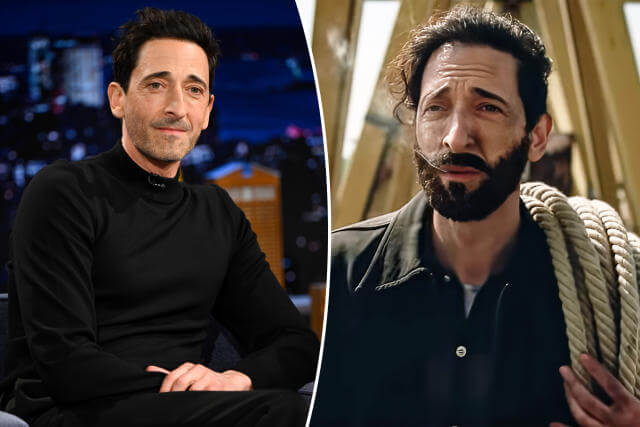world news
Adrien Brody’s Hilarious Makeup Mishap: When a Makeup Artist Tried to Remove His Nose
Introduction: A Case of Mistaken Prosthetics
Hollywood is full of bizarre behind-the-scenes stories, but few are as amusing as Adrien Brody’s recent revelation about a makeup artist mistaking his real nose for a prosthetic. The Academy Award-winning actor, best known for his performances in The Pianist, The Grand Budapest Hotel, and Peaky Blinders, shared the story in a recent interview, leaving fans both amused and baffled.
During a film production, a well-meaning but misguided makeup artist attempted to remove what they believed was a fake nose from Brody’s face. The actor had to awkwardly explain that, in fact, his distinctive nose was entirely natural. This unexpected moment highlighted not only the quirks of working in Hollywood but also the long-standing discussions around Brody’s unique facial features—something that has both helped and hindered his career over the years.
In this article, we’ll explore the origins of this amusing incident, Brody’s perspective on his distinctive appearance, the importance of individuality in Hollywood, how actors use prosthetics in film, and the broader conversation about beauty standards in the entertainment industry.

Adrien Brody’s Unique Look: A Blessing and a Curse
Adrien Brody’s distinctive facial features, particularly his prominent nose, have been a defining aspect of his on-screen persona. Unlike many actors who conform to traditional Hollywood beauty standards, Brody’s unconventional appearance has made him stand out, earning him a variety of complex and often challenging roles.
His breakout performance in Roman Polanski’s The Pianist (2002) cemented his place as a leading actor. Playing Władysław Szpilman, a Polish-Jewish pianist struggling to survive during World War II, Brody’s physicality and emotive performance resonated deeply with audiences. His striking face, filled with pain and resilience, added an authenticity to the character that may not have been as powerful with a more conventionally “handsome” actor.
Despite this success, Brody has also faced industry bias. Hollywood often prioritizes conventional good looks, and many actors who do not fit the mold find themselves typecast or overlooked. While Brody has managed to carve out an impressive career, he has spoken in the past about being perceived as “unusual” or “different” in the industry.
His latest anecdote about the makeup artist’s mistake serves as a humorous but telling reflection of these challenges. In an industry that frequently relies on prosthetics to alter an actor’s appearance, it’s ironic that Brody’s natural features were mistaken for artificial ones.
@fallontonight Adrien Brody’s extensive prosthetics for The Brutalist led to a silly mistake 😂 #FallonTonight #TonightShow #AdrienBrody #TheBrutalist #JimmyFallon
Prosthetic Noses in Hollywood: A Common Practice
The idea of a makeup artist assuming Brody’s nose was a prosthetic isn’t entirely far-fetched. In Hollywood, prosthetic noses and other facial modifications are commonly used to help actors physically transform into their characters.
One of the most famous examples is Nicole Kidman’s transformation in The Hours (2002), where she wore a prosthetic nose to resemble writer Virginia Woolf. Similarly, Gary Oldman underwent a dramatic transformation for Darkest Hour (2017), where prosthetics helped him embody Winston Churchill. Even in comedic films, actors often wear prosthetic noses to exaggerate facial features for effect.
The use of prosthetics in film serves a variety of purposes, from historical accuracy to helping actors physically embody real-life figures. However, it also raises questions about whether Hollywood sometimes prioritizes changing an actor’s appearance over casting someone who naturally fits the role.
In Brody’s case, the irony is that while many actors rely on prosthetics to achieve a distinctive look, his own natural features were so striking that a makeup artist assumed they had been artificially created. This amusing misunderstanding sheds light on the industry’s reliance on makeup and special effects to achieve desired looks—sometimes at the expense of recognizing natural diversity.

The Bigger Conversation: Hollywood’s Beauty Standards
Adrien Brody’s experience with the mistaken prosthetic nose brings up a larger discussion about beauty standards in Hollywood. Historically, the film industry has often favored actors with conventionally attractive features, leading many performers to undergo cosmetic alterations to fit the mold.
However, in recent years, there has been a growing appreciation for diversity in appearances. Actors like Timothée Chalamet, Anya Taylor-Joy, and Adam Driver have gained prominence despite—or perhaps because of—their unconventional features. Audiences are increasingly drawn to faces that feel unique and authentic rather than airbrushed perfection.
Brody’s career serves as an example of how individuality can be both an asset and a challenge. While his distinctive look has allowed him to portray unique, memorable characters, it has also placed him outside Hollywood’s typical leading man mold. His ability to navigate these industry biases while staying true to himself speaks to his talent and resilience.
The fact that a professional makeup artist assumed his nose must be artificial highlights just how deeply ingrained certain beauty norms are in Hollywood. If someone doesn’t fit the expected standard, the assumption is that their appearance must have been altered—even when it hasn’t.
Philadelphia Eagles Jalen Hurts Impacts Progress Air Jordan 1 High Top
Adrien Brody’s Perspective and What’s Next for Him
Despite the industry’s challenges, Adrien Brody has maintained a successful and varied career. From dramatic roles in The Pianist and The Darjeeling Limited to more recent performances in Succession and Poker Face, he continues to choose projects that showcase his range as an actor.
His recent interview about the mistaken prosthetic nose incident demonstrates his sense of humor and ability to embrace his uniqueness. Rather than taking offense, Brody seemed amused by the experience, showing his confidence in who he is. This attitude has likely helped him navigate Hollywood’s often rigid expectations.
Looking ahead, Brody has several exciting projects on the horizon. His involvement in Wes Anderson films and his recent role in Blonde (2022) indicate that he is still a sought-after talent in the industry. As Hollywood continues to evolve and embrace a wider range of faces and talents, actors like Brody may find even greater opportunities in the years to come.
His story serves as a reminder that uniqueness should be celebrated rather than altered. Whether on the set of a film or in everyday life, embracing individuality is what makes people—and performances—truly memorable.
Conclusion: A Funny Story with a Deeper Message
Adrien Brody’s story about a makeup artist trying to remove his nose is more than just an amusing behind-the-scenes mishap—it’s a reflection of the way Hollywood perceives and alters beauty. While the incident itself is lighthearted, it also highlights the industry’s tendency to prioritize artificial changes over natural diversity.
Brody’s ability to laugh at the situation and continue embracing his distinctive appearance is an inspiring reminder that standing out is not a weakness, but a strength. As Hollywood gradually moves toward greater inclusivity and appreciation for different types of beauty, actors like Brody serve as proof that success is not about fitting into a mold—it’s about breaking it.
Whether starring in award-winning dramas or sharing humorous anecdotes about mistaken prosthetics, Adrien Brody remains one of Hollywood’s most fascinating and talented actors. And as his career continues, one thing is certain—his unforgettable face (real nose and all) will always be part of his story.
From decoratedbliss

